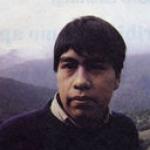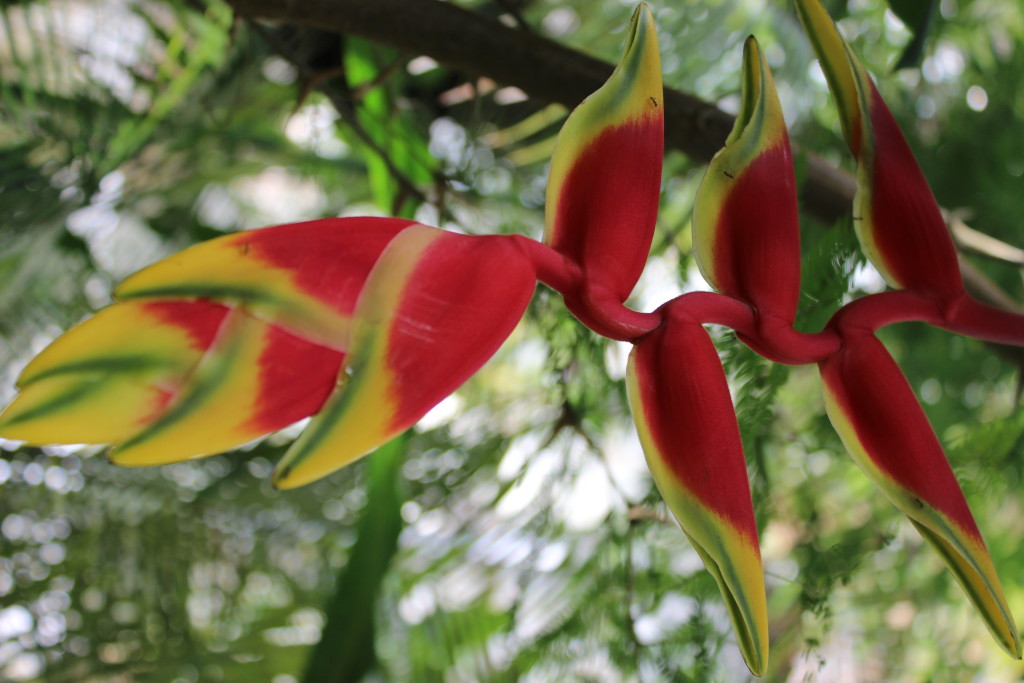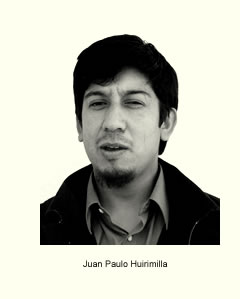Stuart Cooke’s introductory essay to the 2 Mapuche poets is available in the Non Fiction section of The Dreaming Machine n. 1.
Leonel Lienlaf
They Took Off the Skin
The surprise attack came three times
we repelled it three times
but now it comes again
and we can’t resist.
The winka is firing.
We must hide ourselves beneath the mountain
so that our spirit might leave
to sleep above the earth
so that all this country
might sleep above the stars.
As soon as I rested my hand
many weapons surrounded us
taking our Chief
while they beat us.
They took the skin from his back
and cut off his head.
Our valiant Chief!
and the skin of his back
they used as a flag
and his head they tied to my waist.
We keep crying and our blood
flows through the land
from time to time I lower my gaze
to the face I carry on my waist
and it seems that now it’s going to speak
but it continues in silence.
A man comes galloping
across the pampas
and his luck gallops
over his horse
calling to his dogs.
All the pampas hears his cries.
His gallop says
Kenditu – Kenditu
Lautraro – Lautraro
and his dogs follow him like the wind.
They come down shouting across the country
whistling through the streams
I run to see my people,
my blood,
but they’re already stretched out over the soil.
The winkas pass over them
spreading death across the earth,
splitting my heart.
In search of my warmth
I entered a burning house,
the stream flooded with my tears
raining on my feet.
Do you people understand my tears?
Listen to the air explain them.
The years are passing,
over the fire the nests are passing,
the earth is passing
and I am already losing myself
between the words
Listen to my tears speak.
Lautraro – also known as Lautaro (1534–1557), was a leader of the Mapuche resistance during the first phase of the Spanish invasion. He has been immortalised in countless street and suburb names and sculptures in southern Chile, and also appears in Pablo Neruda’s Canto General.
malón – traditionally refers to a hostile Indian attack; using it to refer to the invasion of the Spaniards is, therefore, deliberately ironic.
winka – is the name Mapuche people use to refer to a non-indigenous Chilean (like balanda, kartija, etc).
Meulen
Amidst clouds of dust
Meulen came down to the valleys,
whispering beneath the rocks
They say
that in the early morning
Meulen flew
across the sky
Asleep between the vegetables
I was listening to his murmurs,
the soft night passed between the hills
Veloz,
a bird of dust
numbed my face
with its flight.
Kürüf
Over the cleared country
anguished
the wind whirls about;
over the dust and the ashes
the nests blown
from where birds dreamed
The wind
went crazy between the rocks
because to its ears
the soft song of the trees
came no longer.
Sunset
Bird calls
and on the paths
the shadows come out to look
at the slow passage of colours
over the horizon
The distant whirring of the chainsaws
shakes the falling night
over faded cinnamon trees.
Muelen – (Mapuzugun) a whirlwind.
Veloz – rapid, quick. An association is being made between Latauro, who was also known as a ‘fast bird’ for his guerrilla techniques, and the movement of the bird in the poem.
English translation by Stuart Cooke.

Leonel Lienlaf is a key figure in contemporary Mapuche poetry, working not only in the medium of writing but also in traditional Mapuche song, or Ül. He writes primarily in Mapudungun and often translates his own work into Spanish. His first verse collection, Se ha despertado el ave de mi corazón, was awarded the Municipal Prize for Literature in Santiago, Chile in 1991. His other works include verse collections Pewma dungu/Palabras soñadas (2003) and Kogen (2014), as well as the audio CD Canto y poesía mapuche (1998).
Juan Paulo Huirimilla
Warrior Song
I hunter-gatherer
urbanite of jacket and leather
Combed with hair gel
born in shit
From Pedro Eriazo
With a harmonica
between my teeth
I stammer for the deaths
of my ancestors
With a split scowl
Few words
I have lost
My identity card.
I watch the gangsters
who search for us in dreams
Because we cut the eucalyptus gas
And lit fires
with candles of the virgin mother
Now I speak with a sneer
Turning in circles
until the smoke burns
And the water keeps falling.
I stretch out for the tree in the river
with a piece of Licán
So that death won’t return
with that bird from the city
So ominous at night
– it is always the other
in the shattered reflection
of a photograph –
the words Castilian or Chilean
mean nothing
they emptied in a well
in which my teeth chatter
I can only be with her in childhood
when my hands could clasp
a swing by the plum tree
flowering with roots bending inwards.
So this is reality
a scar on a bandaged man
who remembers travels across the ocean
In the beginning
And the music of our bones heading towards death.
Poetics
Oh! reader! My object of study
The most western point of the labyrinth
Fix this frothy drivel
Because poetry is a green feature film
A cowboy movie
And you are the Indian who will never reach
The stagecoach
Because John Wayne has aimed his rifle
Between your teet
And the pale-faced knife
Is hidden deep within my writing
Oh my reader! Enemy
race the clock to your left
your insides will fill with blood.
Stagecoach – the Spanish word for la diligencia (stagecoach) also refers to both speed and diligence.
Rivers of Swans
1
The river of swans sprays foam
On the ocean of the white page,
Searching for the red crest and black neck
In the signs of the lamilla.
Seagulls shout out in the red glow of autumn
Leaves stripped from the trees.
The river of swans has diminished
Its plumage taken by the black tide.
2
The bloodstained swans of the river
Can sell their vegetables no longer:
The waters that irrigate
Are full of metals.
The birds land in the courtyard
Of a young swan, a poet who envelopes the patio
With his white gaze.
3
My son, Ave Veloz, awakes to draw
Four birds with black necks
One is his mother who takes him up on her back
Another is of me, who follows and channels the water
The wind and clouds of the landscape:
We are absorbed
By the sun of the picture.
4
The sign of the swan of which Martínez talks
Appears but without meaning
So the man is also die-cast
Who sees from the shore
Four creatures flying
Beneath the same language.
5
The lake filled by the blood of Licarayén
The sunken water and earth
Exploited
Birds to whom Lucila sings
In the language of the Licanantay and the world
Because only they remain
Others
Have been displaced by law and rifle
To the mountains stripped so that we might forget
What is ours.
6
Mallarmé your entire poetic project
Could have been, perhaps,
To write about thousands of swans in winter
With multiple words on only one page
Or to speak from memory poems
Representing the signs of the imagination
Like rubén Darío or Alfonsina Storni
Whose dream before an ocean breathes in silence.
7
Listen Lucila Fantasma I’ve already lifted
The serf onto my shoulder
And onto the other one a Pingangu Colour albino
Mutro we say
Son of an enchanted bird
Who has left the bank of the lake
For folly
Who doesn’t fly in the wetlands
Now covered with heavy metals.
8
I turn around in the island desert like the black swan with red crest.
I fly around looking for the inland sea.
I have seen it in these other black swans with red crests.
To also see the world with its four directions.
I see one dance and sing the way her grandmother did
and the grandmothers of her grandmothers
and she paints a white fabric with many spots of colour
which become the parallel dreams of my kidnapped grandparents
who speak through my saliva.
They have stolen the children of the black swans with red crests
They have been made to fly to the cities and care for their cattle
Bird sisters who have not returned.
May you swim now, the Koori swans with all your rainbow snakes
That you’ve created
May you search beneath the water for the seaweed
That will make your snakes breathe eternally against oblivion.
The black swan of red crest appears to me in another island
On a page
But its colour is more luminous than rebellion.
9
Lennon sees two completely white swans in the
Thames
I sing to them while the rain
thickens
and the police collect the
bodies
Of the world’s alienated, who
see those signs swimming across the landscape
of this gloomy guarded city.
10
In pairs the black necks walk on the ocean
And the bodies swim between the black page and the sargassos
The acid rain wets their feathers and they peck at themselves
searching for part of the rainbow in the water
they climb to the river’s edge to bathe after the rain
these our birds whose necks should be cut says a poet
a musician made them dance on the lake
myself I call them from the beach of the petrified cypress
and they follow us and launch into flight
through the air choked with fumes and ash.
Rubén Darío – (1867–1916), born in Nicaragua, a pioneer of the Latin American Modernismo movement.
la lamilla – a coffee-coloured seaweed eaten by the swans.
Licarayén – a young virgin sacrificed in order to calm the fury of Añuñauca volcano, today known more commonly as Osorno volcano.
Licanantay – indigenous people from the north of Chile.
Lucila – Lucila Godoy Alcayaga, Gabriela Mistral’s real name.
Juan Luis Martínez – Chilean poet, says that in a poem it is only signification which is important.
Mutro – (Mapuzugun) an albino swan, which is generally of a golden colour. petrified cypress – the alerce is known as the Patagonian cypress, common in Southern Chile.
Pingangu – (Mapuzugun) a swan.
Alfonsina Storni – (1892-1938) a major Argentinean poet of the post-modernist movement.
Ave Veloz – ‘Fast Bird’, another name for Lautaro.
English translation by Stuart Cooke.
The above poems are taken from Stuart Cooke’s article “Two Mapuche Poets”, which appeared in 2010 in the journal Heat https://giramondopublishing.com/product/heat-22-the-persistent-rabbit/ available online through https://research-repository.griffith.edu.au/bitstream/handle/10072/61272/88787_1.pdf;sequence=1
Juan Paulo Huirimilla (Isla de Calbuco, 1973) is the author of El Ojo De Vidrio (2002), the influential poetry collection Palimpsesto (2005) and Weichapeyuchi ul: cantos de guerrero: antologia de poesìa politica mapuche (2012). His work blends in a surrealist way elements of French Modernism, popular Western culture and references to Mapuche cosmology. He’s widely published online and many of his poems are included in anthologies. He is currently teaching at Universidad de Los Lagos in Chile.
Featured image: Photo by Melina Piccolo.





















































